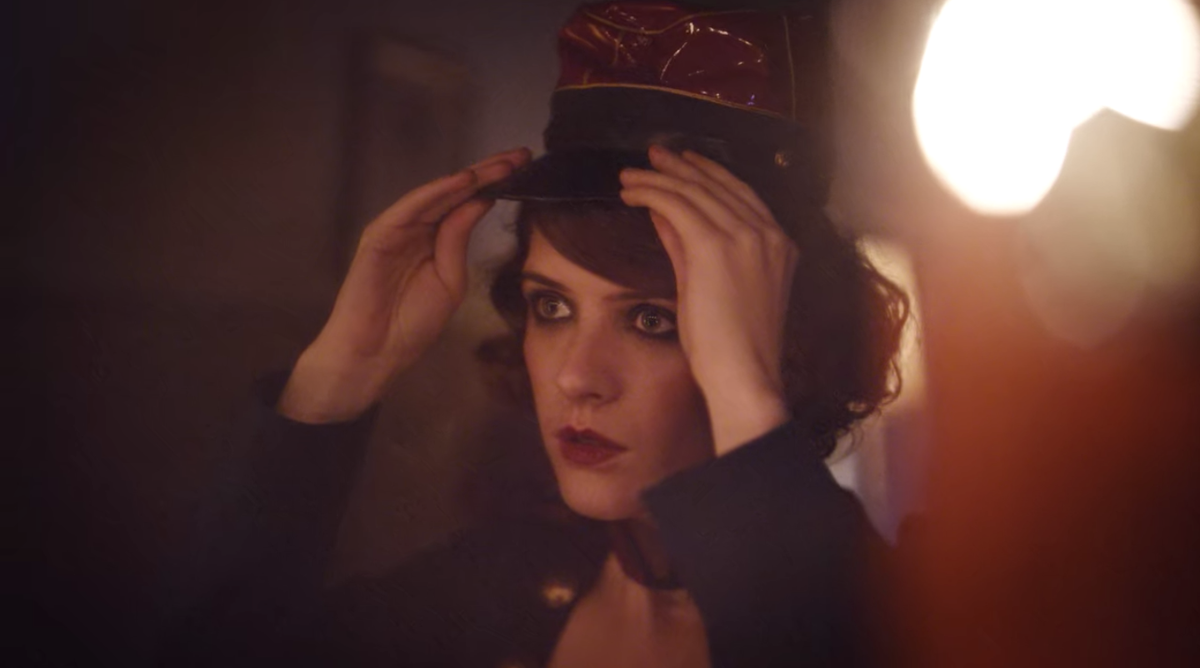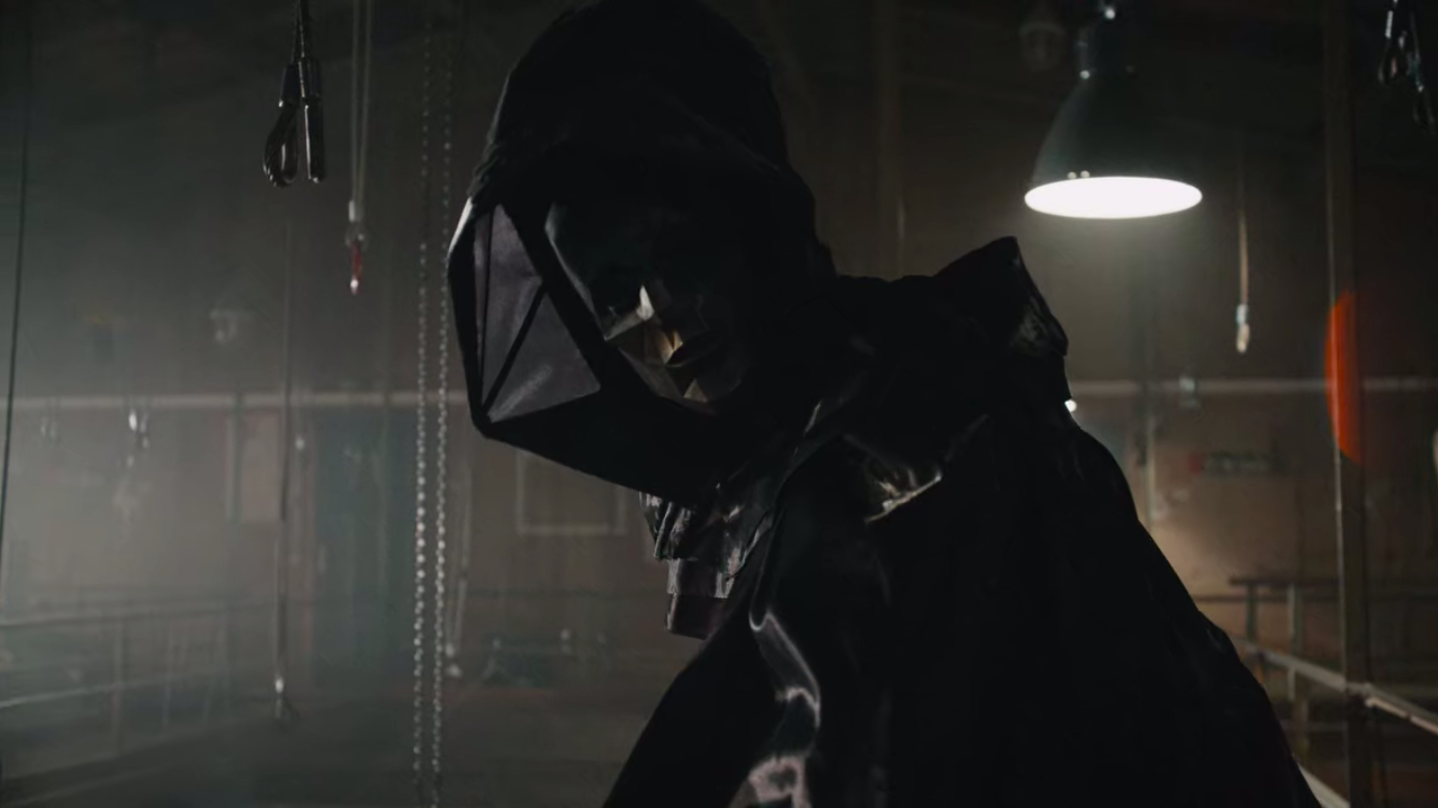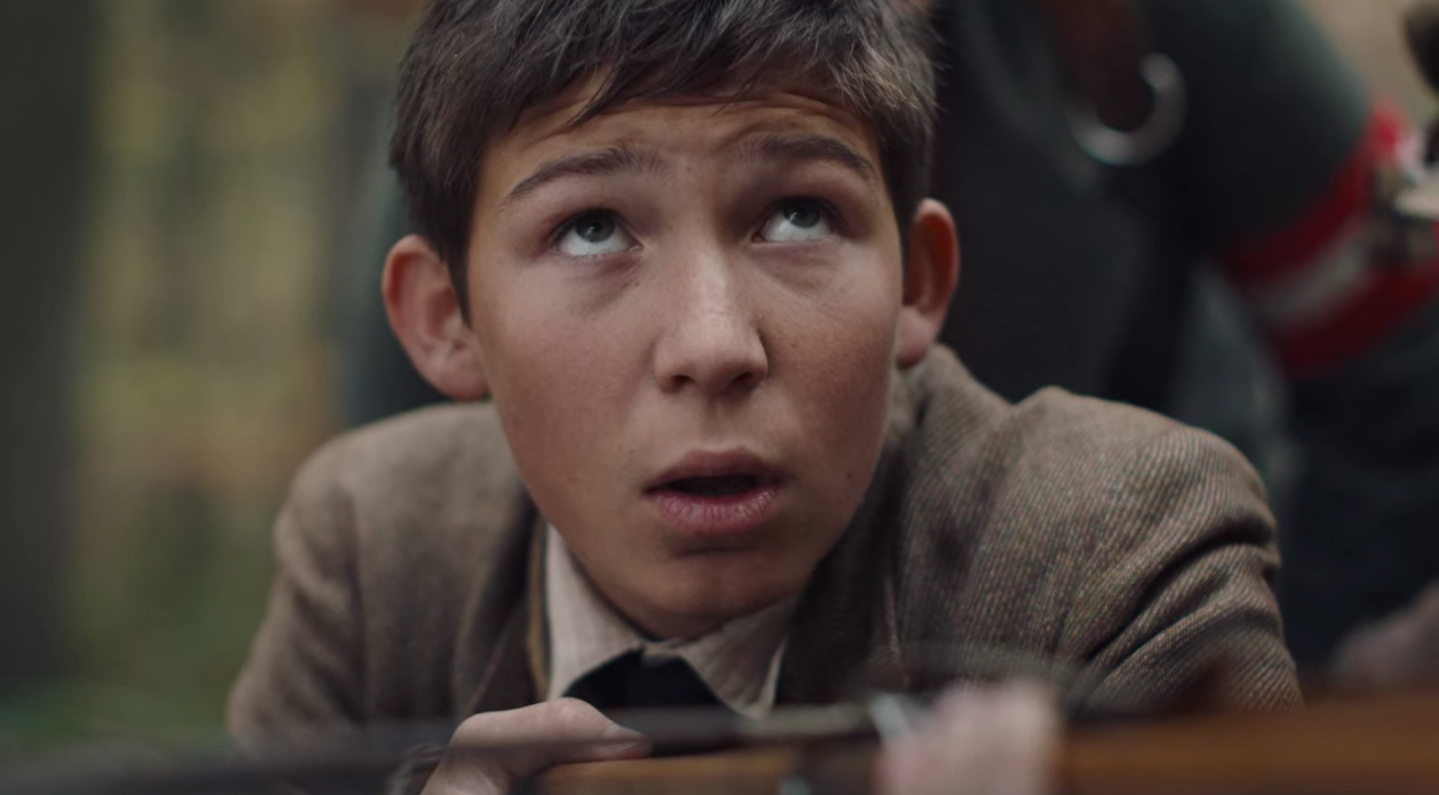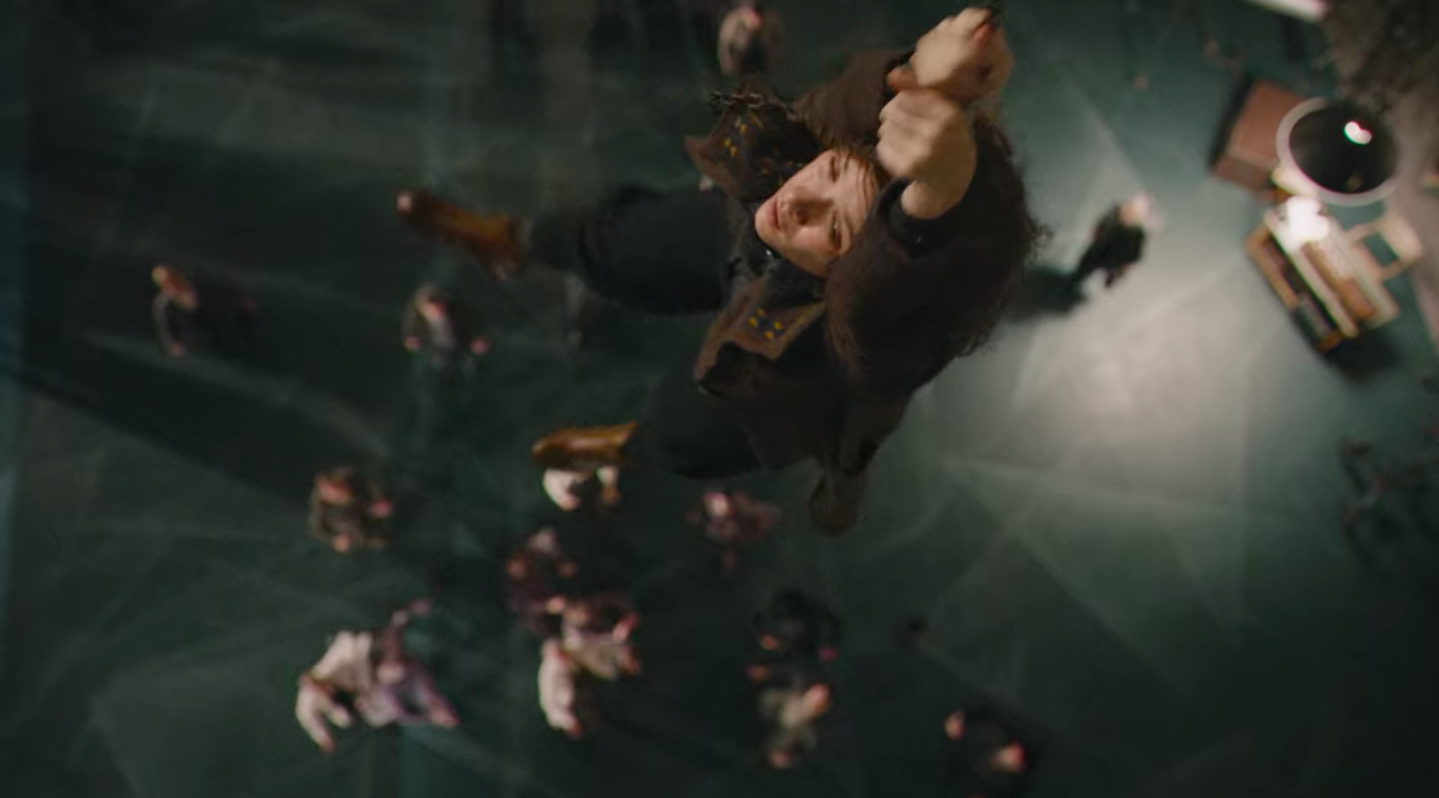Babylon Berlin: "Episode 23" and "Episode 24" (with Lily Osler)
In which........... Charlotte! No!

(For the foreseeable future — aka as long as this quarantine lasts — Emily will be watching the critically acclaimed German drama Babylon Berlin, a neo-noir set in 1929 Germany. The series is available on Netflix in the United States. For every installment, she will be joined by a special guest. Today’s guest is the extremely funny writer Lily Osler. Find her on the internet on Twitter and all over the internet.)

Emily: I don’t know what I was expecting from the third season of Babylon Berlin, but it surely wasn’t Charlotte wandering into a depraved sex show undertaken for the delight of an old man in a military uniform. It’s a scene that viscerally turned my stomach. On a show where the portrayal of sex work, of naked bodies, of lustiness in general has always been about as sex positive and non-misogynist as a TV show made by three men could possibly get, this feels like shattering some fundamental rule of the show. It’s dark and depraved and hard to watch. But that was its intent.
The circumstances that lead Charlotte to this point — she needs to save the money to get an eye surgery for her sister — feel sort of tossed into the plot by the writers, in a way that brings the whole idea down, for me. But I get what we’re going for here, all the same. These two episodes are filled with the slow, creeping decay of a society falling apart more quickly than anyone can repair it. From Toni stumbling upon the family shivering in a back alley to Nyssen’s plot to bankrupt the whole country and further enrich himself and his co-conspirators, these are episodes filled with economic desperation that takes darker and darker turns.
But still! Charlotte looking at herself in the mirror and reminding herself of her job with the Berlin police is almost impossibly sad, because then she wanders away from her dreams and into a weird combination of Cabaret and the film Suspiria (I know this is a comparison you’re going to make Lily, so I apologize for swiping it from you). The master of ceremonies, the weird collection of men in uniforms, the shadowy figure overlooking it all — it’s like a symbolic attempt to portray a Germany that is coming apart at the seams.
It feels wrong to boil these tense and involving episodes down to their most disturbing scene, but that was the effect that scene had on me. For instance, when I sat down to write about them, I almost completely forgot about that incredible sequence where the characters pursued the ghost around the film studio — complete with Gereon getting impaled through the cheek — so heavily did Charlotte’s jaunt into the German subconscious loom. But these episodes are really good, and they advance an idea you’ve been sharing with me when we’ve chatted about the show, Lily, an idea that makes me wish to subscribe to your newsletter.
So tell me why you (or more accurately your partner) think this season is a giallo. (Also we should probably define giallo.)
Lily: Hey Emily! Thrilled to be here discussing America’s favorite show about the slow, deliberate rise of fascism in a democratic society and also a ghost who likes to stab people.
So, one thing I think you’ve been very perceptive about in these newsletters is that Babylon Berlin is never just one thing. Right now, I can think of at least six different shows going on at the same time within BabsBer: a grim prison drama, a trippy psychological puzzlebox, a girl-making-it-in-the-big-city character study, a tightly-crafted police procedural, a twisty drama on the underhanded machinations of the Nazis, and, like you mentioned a second ago, a pretty gruesome giallo that forms this season’s core in the Betty Winter storyline. It’s a miracle of good writing that these all cohere as well as they do, and I think that’s largely attributable to how well-drawn the show’s characters are and the way the show’s conflicting tones work as a metonym of Weimar Berlin itself.
First, some definitions: giallo is a genre of Italian film that peaked in popularity in the 1970s that lies somewhere between a thriller and a horror movie, at least in the American conception of the terms. Descended from lurid crime novels that were popular in Italy during the 1930s (the books’ covers were typically yellow, hence the name), gialli tend to follow an investigation into a series of gristly, luridly-drawn murders that continues to take victims as the detectives (or, sometimes, plucky heroines working outside the system) search for their evidence.
What makes gialli distinct from other genres of film that deal with solving murders — and what pushes them toward horror territory, even in films like Dario Argento’s Profondo Rosso where nothing supernatural is going on — is the heightened, surreal, genuinely dreamlike atmosphere that suffuses every scene, especially the kills. Killers wear punctilious, bizarre outfits and murder their victims with proto-slasher-movie gore. Setpieces take place in dramatically lit Italian piazzas or old German mansions. The lighting sometimes goes green, pink, or or purple without explanation. Key plot details make absolutely no sense logically but still feel true and coherent. In every frame, there is the sense you are watching a gristly fairy tale from another planet.
While I love gialli and know I share my high opinion of them with many film critics and academics, it’s maybe worth noting that some people find them interesting only for their gore, or even bad movies worthy of an MST3K-style riffing. To each their own, but I think this polarized reaction is because gialli are, not to put too fine a point on it, fucking weird as hell. Either you love the dreamlike sense they give off or it just doesn’t click with you.

It was my partner, Sara McCartney (a grad student studying horror film and literature; follow her on Twitter), who first noticed that this season’s Babylon Berlin murder mystery was a by-the-book giallo. And once she said that, it was pretty much impossible to see any other way to read the Phantom of the Expressionist Film plotline.
The killer’s costume, for one thing, is peak giallo, as is their preferred, stabby method of killing and the way the wounds they inflict are creatively, almost free-associatively gruesome (see: Gereon’s unfortunate encounter with the iron maiden and yet another case of someone on this show getting stigmata they didn’t ask for). And that green lighting coming from nowhere in Gereon’s hospital-hallway encounter with Edgar is straight out of Suspiria. Maybe most importantly, the killer’s total obscuring of their identity, seemingly immense strength, and air of the supernatural make them a classic giallo villain. (You’ll notice that I’m not gendering the Phantom here; that gets at a theory I have about their identity that I’ll share in a bit!)
I don’t think every part of this season can be framed as a giallo, but I think the frame story — the murder of Betty Winter — definitely is, and I think that a lot of the show’s more out-there pieces in Season Three, like the deeply disturbing scene of Charlotte returning to sex work you mentioned, have their tonal and atmospheric roots in that same dreamlike giallo mode of storytelling, where evil is stylized, calmly controlled chaos and intuitive sense is more important than logic. Much as previous seasons were, at their core, freewheeling noirs, I think there’s a good case to be made that this whole season is deeply indebted to gialli.
I’m still trying to tease out just what it means that Babylon Berlin seems to be nakedly imitating classic 1970s gialli. Maybe it’s that one of giallo’s endlessly recurring themes is the impotence of those in authority to make sense of evil, to categorize it and make it fit within the workings of bureaucracy. Maybe it’s that giallo’s surrealist atmosphere rhymes with Weimar Berlin’s own phantasmagorias. Or maybe it’s just a show at the top of its game slipping with ease into yet another mode of storytelling.
Anyway! That was a lot about Babylon Berlin and giallo, and not a ton about these episodes, which were among my favorites of the entire series so far. How do you think the nightmarish violence of “Episode 23” figured into the story Season Three is trying to tell? Do you think a narrative is starting to cohere in these episodes? And I do have to ask: how do you feel about the ethics of watching a cop show in this present moment? (I’m not too bothered because Babylon Berlin seems to view the police as a fundamentally corrupt institution and goes out of its way not to normalize their corruption, brutality, and bigotry, but I’m curious whether you feel differently.)
Emily: I was going to bring up the weirdness of talking about a cop show at This Point In Time, but the more I thought about it, the more I realized Babylon Berlin was the perfect cop show for this moment, better even than The Wire. As you mentioned, the show finds the police to be a horribly corrupt institution, which helps. But so does the way the entire series turns its eye toward the idea of an entire society turning a willfully blind eye to the evil it’s about to be complicit in. Babylon Berlin is a series about how unlikely it is for any institution to save you from encroaching fascism. All you can hope for are a few brave individuals to do so, and only if they can find a way to band together. The police won’t save you; only you can save you.
Those ideas are present in nearly every scene of these two episodes. Plot-wise, I’m not sure this season is cohering yet, but thematically, it feels like it’s drawing its noose tighter and tighter. The scene with Moritz out hunting with the Hitler Youth is a good example of this. Outwardly, it’s just a scene of some boys in the woods, but the historical context that we in the audience place over it gives it a chilling overtone. We don’t think that Moritz — who is a little slow but basically good-hearted — would fall for what the Nazis are peddling, but we also know how many Germans did.
There’s some sort of grand symbolic idea going on in this season that I’m not yet tapping into, not quite. What’s true in every storyline is that there’s an almost hallucinatory distraction for the characters, that they’re struggling to keep from tumbling over into dream logic. And that’s true of a nation on the brink of fascism too, I think. The Phantom stalks everyone, and they might be everyone, or they might be no one. There’s something metaphorically potent about this ghostlike figure that haunts the season’s sidelines, somehow capable of being both very specific and mundane in their evils — sometimes, they just shoot people — and also incredibly strange and supernatural. Evil is everywhere, and it’s nowhere.

One thing that I adore about this show are those moments when storylines collide with each other, as the series starts to pull its many weird threads back toward its center of gravity. Gereon hauling “Fritz” (he’ll always be Fritz to me!) in so Greta can identify him (and of course she doesn’t) is one such moment, and the chaotic way that MaLu ping-pongs across storylines is another.
But it’s Greta who struck me most with her incredibly sad and melancholy march toward seeming death, begging for Dr. Völcker to give her a hug, tearfully confessing that she has been lying about who helped her kill Benda because she’s so worried about her son. The threat of Greta’s previously unseen child driving much of her storyline is a weaker point in the season, but her slow acceptance of her fate has been good throughout, and I love the way her refusal to say anything clashes with Gereon’s certainty that there’s some larger story he’s missing. He is, but not in the way he thinks he is. Maybe he should have gone with Moritz out into the woods.
You mentioned the violence of “Episode 23,” which is the episode where Gereon gets a spike through the cheek (always a good time) and where Vera finds herself stumbling along, losing blood. I won’t lie. Even though I know Charlotte and Gereon are endgame, I found myself irritated that the series introduced a woman love interest for Charlotte, teased that connection, then killed Vera off without really exploring what it would mean to be queer in 1929 Berlin (a subject that has haunted the show’s edges without taking centerstage). The connection between Vera and Charlotte was strong enough that Charlotte seems destroyed by Vera’s death, but all we get are hints of that connection. I wanted more!
And yet the fakeout of the Phantom’s identity at the end of the episode is so well done. My wife pegged that the real Phantom had pushed Weintraub and Vera off the side of the building, allowing for their escape, but it’s still a beautifully deployed plot twist. And the scene where Charlotte dangles above the soundstage floor is another example of how she’s the one character who works with each and every tone the series deploys.
I do want to hear how you feel about the Armenian storyline and how it fits into all of this. And what do you think of the creepy offer Toni receives?
Lily: I think your analysis of why Babylon Berlin is the right show for this moment is spot-on.
At dinner a few minutes ago, my dad asked, kind of philosophically but also kind of not, whether faith in democratic institutions can ever be a distraction from encroaching fascism, and I think the answer is a clear "yes" for exactly the reasons you set out. It's a scary thought, but one I think we all need to sit with in this moment, and Babylon Berlin is art that helps illustrate it.
Oof, the scene with Moritz in the woods — I'm not going to dwell on it too much, but having been in the Boy Scouts as a young girl myself (oh, gender dysphoria!), I recognized far too much of my own experience in Moritz's time with the Hitler Youth — the vicious hatred of tenderness, the valorization of violence as a glory and necessity, even the open racism. Babylon Berlin is a show that hates fascists first and foremost, but I don't think it has much love for traditional masculinity, either.
In all honesty, the Armenian's storyline has been one of the things I've found least interesting all season. In S1 and S2, he had an air of mystery and a coolly terrifying presence that made his sparing appearances effective; he feels overused this season, and his appearances seem to be an attempt to ground the Phantom storyline in plot minutiae, which feels like a huge mistake — what's great about the Phantom is how dreamlike their story seems. The sequence in “Episode 24” in the hospital felt like a return to form for ol' Edgar and integrated well with the tone of the Phantom plot, which gives me a little hope, but honestly I'm kind of burned out on his antics. Give me more Phantom!
(Speaking of, I said I'd give my theory about the Phantom's identity a bit ago! So, in gialli, it's very common for the detective's fatal mistake to be assuming the killer is a man when, in fact, she's a seemingly-harmless woman whom he's already met several times. I already had my suspicions about Esther, but once the giallo connection clicked into place, she became my lock for the Phantom's alter ego. And Weintraub saying her name, albeit in a different context, as a direct response to Edgar's question about who was inside the suit gives me a little more ammo. I'm not sure what her motive would be, precisely, and she'd have to be a lot stronger than one would expect, given her frame, to pull off those murders, but if this season really is Babylon Berlin's giallo season, those aren't plot holes — they're just fealty to the genre.)
I'm worried about Toni. It's very hard not to draw parallels between the offer she gets in the café and the subtle way Greta got pulled into "Fritz's" circle, even though I don't think the road she's headed down is one that will lead to the Nazis. Leave our redheaded naïve young women alone! (MaLu, though, you can throw into whatever you want; I trust her to wriggle out of any situation with her icy, profoundly collegiate wit.)
You mention Charlotte as the show's center, and I agree wholeheartedly (which is part of why I felt so betrayed by the ending of the Vera plot, too). These episodes were crazy rough for her, particularly the sex work sequence in “Episode 24.” Where do you think she has to go from here?

Emily: Oh, poor Charlotte. I think it’s really fascinating that her dream is to be the first woman detective for the Berlin police. It’s a goal she should, theoretically achieve, as she’s a really great crime solver, but there are times when Babylon Berlin feels a little like it’s making Charlotte the living embodiment of the “HIRE MORE WOMAN PRISON GUARDS!” joke. She wants, desperately, to prove herself, but she’s working in service of something that will swallow her up and spit her out.
Really, that’s what’s happening to everybody in this season of the show. Because the series spent most of the first two seasons building slowly, slowly, slowly to the reveal of the Nazis, it can spend this season letting the storm clouds gather on the horizon. Everyone is trying their best to keep their heads above water and live out their personal lives, but everywhere around them, something big is about to swallow them from below.
I think Babylon Berlin might agree with the notion that a faith in democratic institutions is one way to miss the rise of fascism as it lunges up out of the darkness. The US’s recent flirtations with fascism (and sometimes more than flirtations) have been galvanizing, because they’ve resulted in the sorts of political protests we haven’t seen in my lifetime — and yet it’s not hard to fear that if Trump is voted out of office this November, a lot of those in the streets will return to their homes, secure in having done the right thing. Democracy is a lovely thing if you can keep it, and the Nazis were voted into power.
(By the way, my wife agrees with your “Esther is the Phantom” theory, and I’m inclined to think the two of you are right.)
Anyway, that all feels much too heady for a couple of episodes that, again, featured a cheek piercing. I have one last question for you, which is: Who are your favorite characters in the show who aren’t one of the main two?
Lily: Oooh, that's a good question! Off the top of my head: Marie-Louise Seegers and Gräf.
Gräf is one of the few men on this show who is allowed a deep gentleness and resilience, despite the profound trauma in his past, and his acts of heroism always feel so earned and pure. In this show, it's clear someone like him, who is just wholesome, belongs largely in the background, but I'm glad he's there, and I am trying so fucking hard not to think about what is going to happen to him when the Nazis come to power. Plus, he's a queer character whose queerness is important but by no means his whole deal, and his flirtation with Gereon in 304 felt so goddamn cute without being queerbait-y, in my opinion. Luv u, Gräf [emo girl hand heart].
Marie-Louise Seegers is the snarky bisexual Wes Anderson communist I want to be when I grow up.
Emily: Thank you for joining me, Lily. Where can people find you on the internet?
Lily: I have things in The New Yorker's Daily Shouts and McSweeney's Internet Tendency, and you can find me on Twitter dot com I guess.
Emily: Thank you again, and join me back here next week, readers, for our penultimate Babylon Berlin recap!




